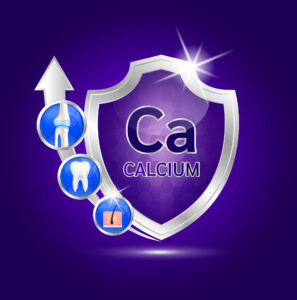Calcium is the most recommended supplement for bone health by doctors. Yet, many people are concerned about the side effects of calcium supplements. While others think that calcium obtained from natural sources must be enough for the body’s well-being.
What is true? What is just a rumor? To figure that out, we have summarized here some important facts about calcium, its importance, its natural sources, and body requirements. Also, we have shed some light on different types of calcium supplements and which one is the best choice for optimal bone health.
Not only that, but we’ve also covered some potential harms of using Ca-supplements in excess so that you can make an informed decision.
Sit back, relax, and enjoy reading!
Why is Calcium so Important for Our Body?
Calcium is essential for maintaining and building new bones. Standard practices for treating and preventing osteoporosis include calcium supplementation. It is a common component of antacids and can help in lowering excessive blood levels of phosphorus, magnesium, and potassium. There is strong evidence to support its ability to lower or manage high blood pressure as well.
Why Calcium Supplements?
In several age groups, calcium supplementation is a common procedure that has been widely advocated to increase bone density. Calcium is commonly seen as being always beneficial to health by the general people, thanks in large part to effective marketing and numerous clinical practice recommendations. In the United States, calcium supplements were used by 61% of women over 60 between 2003 and 2006. (Source: National Library of Medicine)
Calcium Requirements Kids, Men & Women

For adults aged 19-50 the recommended upper limit for calcium is 2,500 mg a day. For adults aged 51 and older, it is 2,000 mg per day.
Kids
| Age Range | Calcium: Recommended daily amount |
| 1-3 years | 700 mg |
| 4-8 years | 1,000 mg |
| 9-18 years | 1300 mg |
Men
| Age Range | Calcium: Recommended daily amount |
| 19-50 years | 1,000 mg |
| 51-70 years | 1,000 mg |
| 71 and older | 1,200 mg |
Women
| Age Range | Calcium: Recommended daily amount |
| 19-50 years | 1,000 mg |
| 51-70 years (and older) | 1,200 mg |
Harms of Low Calcium Levels in the Body
Most Americans are calcium deficient! Children and adults (of all ages) are at equal risk of the following issues due to low calcium levels in the body for a longer period of time.
- – Low calcium level is a major cause of low bone mass in people that ultimately leads to osteoporosis (especially in women).
- – Low bone mass prevents optimal growth of the body and causes many other diseases other than osteoporosis.
- – Moreover, calcium-deficient people are more prone to suffer from, cramps, muscle aches, spasms, and tingling in hands and feet.
- – Extreme deficiency of calcium can lead to death as well.
Natural Sources of Calcium
First thing to highlight here is, your body does not produce calcium itself. Therefore, it is essential to eat calcium-fortified foods to absorb sufficient calcium in your bones and muscles. The more important thing is that body requires several other nutrients such as Vitamin D (mainly), vitamin K, phosphorus, and magnesium for the absorption of calcium.
So first thing first, you need to consume vitamin D and mineral-rich foods, i.e.
- – Fish (Salmon and Sardines)
- – Green leafy vegetables (Spinach, Broccoli, Kale, etc.)
- – Dairy Products (Milk, Butter, Yogurt, Cheese, Butter Milk, etc.)
Note: The recommended amount of vitamin D is 15 micrograms a day (for adults).
On the other hand, some of the natural calcium-fortified foods are:
- – Fruit Juices
- – Soy Products
- – Beans
- – Milk Substitutes
- – Calcium-fortified cereals
Your body needs several other nutrients for calcium to be absorbed and used properly, including magnesium, phosphorous, and especially vitamins D and K. Many factors, including age, disease states, and medications, can affect calcium absorption. Carbohydrates may enhance calcium absorption while coffee and cigarette smoke may impede it.
Benefits of Calcium Supplements
Most people find it difficult to get sufficient calcium through a balanced diet daily. Therefore, taking calcium supplements is highly encouraged and essential for people of all ages.
Moreover, consuming high amounts of sodium or protein-containing foods will cause rapid excretion of calcium from your body. Digestive system diseases also reduce calcium absorption in your body.
Using calcium supplements, on the other hand, provide ample amounts of calcium alongside vitamin D and other nutrients required for its absorption.
Common Types of Calcium Supplements
Here are the most common calcium supplements available on the market.
- Calcium carbonate (40% elemental calcium)
- Calcium lactate (13% elemental calcium)
- Calcium citrate (21% elemental calcium)
- Calcium gluconate (9% elemental calcium)
Calcium carbonate supplements have the highest concentration of elemental calcium in them. Moreover, it requires stomach acid for absorption. Hence, it’s the best form of calcium supplement and is recommended to consume with food.
Side Effects of Taking Too Many Calcium Supplements
Excess of everything is bad! No matter how beneficial calcium is for your body, taking its supplements in excess will cause harm, here are a few to be aware of:
Taking excessive calcium can cause hypercalcemia (excess calcium in the bloodstream), resulting in lethargy, confusion, and fatigue.
Consumption of high-dose calcium supplements may cause heart disorders.
Final Remarks
Calcium is very important for bone health and the overall well-being of the body and mind. However, calcium supplements should be taken with caution, and after consultation with a certified expert. So that, you can reap maximum benefits from Ca-supplements rather than inviting more problems.
Reach out to Doctor Grimes for a free consultation, and learn more about the calcium needs of your body.
Become a member of Healthy U Academy and get started with your fitness and health goals!
